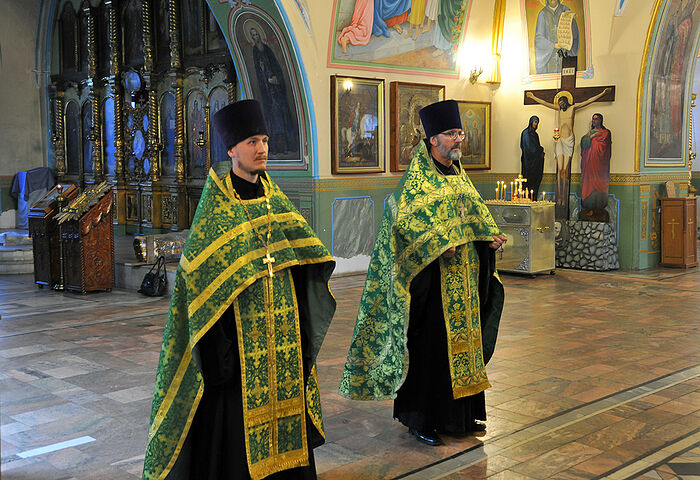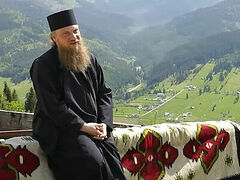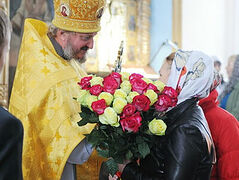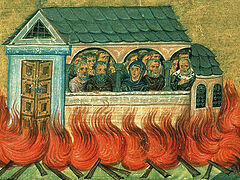At the beginning of Lent, we offer readers a talk with a cleric of St. Catherine’s Cathedral in the town of Slobodskoy (the Kirov region), Priest Alexei Bordzelovsky.
“I came to love church and church services”
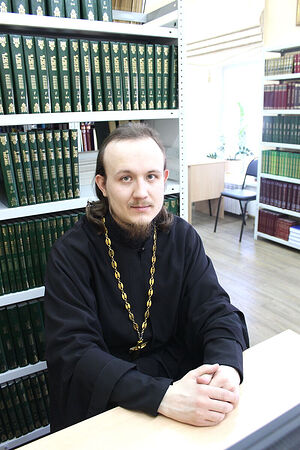 Priest Alexei Bordzelovsky —Father Alexei, tell us about your journey to faith. How did you integrate into Church life?
Priest Alexei Bordzelovsky —Father Alexei, tell us about your journey to faith. How did you integrate into Church life?
—Like many people in our country, I was baptized in the 1990s. My grandmother said that we should all go and get baptized—my parents and I. There was no church in the town (I spent my childhood in Aldan, the Sakha Republic, or Yakutia, in Siberia), and baptisms were performed in a roofed stadium. The bishop himself baptized people. Although I went with my parents, I did not want to get baptized. I went outside and sat down on a bench next to my grandfather. A year later, before school I asked my parents, “When will you have me baptized?” I still remember how I was chrismated. A chapel had already been built, with a baptismal font for full immersion, and after Baptism the priest led me into the sanctuary…
How did I integrate into Church life? Like most people, I was baptized, but did not go to church. Thank God, later I came to realize that I must go to church and live according to the commandments. The whole family began to attend services and my sister and I started going to Sunday school. That’s how my path to God began.
—Why did you decide to become a priest?
—In 2001, I began to help a priest in the altar during services, and over time, I developed the desire to become a priest because I had grown to love the church and its services. And by the time I graduated from school, my father-confessor blessed me to enter a theological school. I graduated from the Yakutsk Theological School, then studied at the Khabarovsk Seminary for three years and completed my education at the Nizhny Novgorod Seminary, since by that time I had moved to Vyatka [another name for the Kirov region, which borders on the Nizhny Novgorod region.—Trans.].
—You became a priest at a very young age. How much did your way of life and worldview change after that?
—By that time my worldview was already religious. As for my way of life, I was married, then I was ordained a priest. Theological schools train future pastors. You participate in church services, get up early, have trips to a monastery for a week to labor, and other activities for spiritual growth that bear fruit. In different dioceses, I saw how priests serve and perform obediences. That is how I gained experience, which I now use in my life.
—Tell us about a typical day in a priest’s life, especially during Lent.
—My day begins with prayer at home. Then I drive to church for a service or on parish matters: it may be the celebration of services of need or solving issues related to parish life. There are more services during Lent. For instance, in the first week of Lent, the Penitential Canon of St. Andrew of Crete is read in churches in the evenings. I spend my free time at home with my family. My day ends the same way—with prayer.
On Orthodoxy in Yakutia
—You hail from Yakutia. Can you give us some specifics of preaching Orthodoxy in Yakutia?
—The distinctive feature of preaching Orthodoxy in Yakutia is that you need to preach in the local population’s native language—that is, in Yakut. From the time of the Holy Hierarch Innocent (Veniaminov) of Moscow (1797–1879), translations of the Holy Scriptures and other Church texts into the Yakut language began. To this day, when priests go on missionary trips to remote areas, they try to read some texts in Yakut whenever possible.
When I studied at the Theological School in Yakutsk (the administrative center of Yakutia), the Yakut language was taught there. At services, they also try to perform some hymns in the native language of the local population. Orthodox churches in Yakutia, as in every other part of Russia, suffered immensely during the Soviet era. Only four churches have survived in Yakutsk—the Churches of St. Nicholas, the Holy Transfiguration, the Nativity of the Theotokos (where the Yakutsk Theological Seminary is now located), and the Holy Trinity. All of them have been handed over to the Russian Church. Now the restoration of the Holy Trinity Cathedral is underway. However, very few ancient churches have survived, and most of the churches are young—built in the 1990s and 2000s. Unfortunately, some remnants of paganism still exist there, such as shamans, fire feeding, and the Yssyakh festival.
To the native region
—How did you end up in Vyatka? Also, tell us about how the land of Vyatka became so close to you.
—As a student in Khabarovsk, I was the subdeacon of Vladyka Mark.1 And in 2011, when Vladyka was to be transferred to Vyatka, I decided to follow him. His Eminence agreed and blessed me. So I moved to the land of Vyatka.
The land of Vyatka became dear to me when I got married (my wife is a native of this region), and our children were born here. In fact, I myself have roots in the lands of Vyatka—some of my maternal relatives live in Vakhrushi (an urban-type settlement), and my grandfather came from the Shabalin district.
—Are you a strict father?
—Yes, I am, but to a point. I believe that sons should be brought up with strictness to prevent them from developing a capricious character.
—Do you have any time for rest and hobbies?
—During my school years I went in for sports. Now I spend my free time with the children: we play and draw together. Sometimes I manage to read some literature. The last book I read was Fatherlessness by Viktor Nikolaev. It is about difficult teenagers. The author is an Orthodox Christian. A former officer who served in the Afghan War, he has books on serious subjects.
—Why is it important to attend church services?
—A church is a place where God dwells, and prayer is communion, dialogue with God. There is no salvation outside the Church, so it is important to participate in Church life—not just to attend church, but to confess and receive Communion.
The Lord gave the commandment: Six days shalt thou labour, and do all thy work: But the seventh day is the Sabbath of the Lord thy God (Exod. 20:10). But people justify their laziness by saying that they need rest, do household chores, or do not understand anything in church.
We are all like babies: first a baby crawls, and only then begins to walk independently. This is also the case in spiritual life—first you come to the church and you don’t know much, and only with time does understanding come. We hear in the prayer before Communion: “May the Communion of Thy Holy Mysteries be neither to my judgment, nor to my condemnation, O Lord, but to the healing of soul and body.” So where do we get our strength if we don’t live by the sacraments of the Church? All hope and consolation are in God, and this is understood by those who turn to Him, pray sincerely and live the Church life. And the Lord Himself exhorted: For where two or three are gathered together in My name, there am I in the midst of them (Mt. 18:20).
“We have a soul that needs to be nourished”
—In your opinion, does it make sense for a layperson to observe fasts outside the Church, without participating in liturgical life? Will God accept it?
—That would be no more than a diet. You can lose weight at any time and don’t have to do it before Pascha. We have a soul that needs to be nourished. If we put the body in order, why don't we take care of the soul? It needs to be nourished, too—by good works, and by mercy. Life was given to us so that we would take care of the soul and prepare it for eternal life.
People begin to chase after worldly blessings and get satiated with them in order to satisfy their spiritual hunger. Three, five rooms are not enough for them; they buy expensive cars and yachts, constantly go shopping in order to purchase more and more new clothes that they will probably wear only once or twice. And they don’t care that others near them need help. Blessed Augustine wrote:
“All human troubles come from the fact that we enjoy what we should use and use what we should enjoy.”
He hit the nail on the head! And this is what happens in our lives. Instead of using an apartment or a car we enjoy it, and when we come to church, we use it as a “rescue service”. “When I need something, I will come, ask for help, get it, and then forget.”
The Apostle Paul says: your body is the temple of the Holy Ghost (1 Cor. 6:19). And if our body is a temple, then we must take care of it so that our soul can be rich. But man has “chained” his soul to his body and he does not care about it. If our body is a temple, then why are we lazy? Why do we drink, smoke, swear and infect the soul with all sorts of garbage? If the body is a temple, it must be clean and beautiful, like a church. It depends on us whether we will be rich in God (cf. Lk. 12:21) and provide ourselves a treasure in the heavens that faileth not (cf. Lk. 12:33), or will, to the contrary, be preoccupied with earthly things.
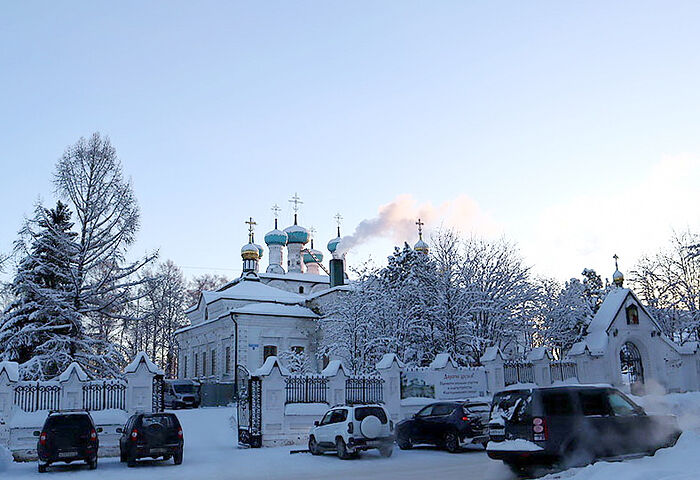 St. Catherine’s Cathedral of the town of Slobodskoy
St. Catherine’s Cathedral of the town of Slobodskoy
—What should be the motivation of young people to get up early on Sunday morning and go to church to pray?
No one forces you to go to church at seven. If you want to sleep, come at nine. As St. John Chrysostom says:
“A week has 168 hours; God appointed only one of them for Himself—and you spend it on worldly pursuits. You neglect this occasion to attract the grace of your God.”
It is difficult to pray attentively at services because we are distracted and unable to pray The devil is always plotting something against us, and therefore we are overcome by various thoughts during prayer. As for motivation, you should ask yourself the question: “Do I want to be with God or not?” They keep telling us on TV: “Take everything from life.” So young people do. There is a saying: To get rich in God means to gather and multiply good works. Jesus Christ tells us to lay up treasures for ourselves in Heaven, where neither moth nor rust doth corrupt, and where thieves do not break through nor steal (cf. Mt. 6:20). The place where we can gather these treasures is our heart. Some will live for thirty, fifty years before they go to confession for the first time, while others only remember God on their deathbed and regret not having come to church earlier. This life was given to us in order to prepare for eternal life. But we say, “You go and don’t wait for me.” As a result, the ship sails out, and the chance to come to God diminishes.
“So that there may be no spiritual sleep”
—The time of fasting is also a period of uprooting sinful passions. Where is it best to start?
Everyone knows for themselves where to start, which bad habit or character trait to fight. Every year during Lent we hear the hymn: “My soul, my soul, arise! Why art thou sleeping?” And we must always remember these words so that there may be no spiritual sleep, so that we can take care of our soul, nourishing it through good works and thus acquiring spiritual riches. And it depends only on us whether we will stand on the left or on the right side of the Judge of mankind, because the Lord will not save you without you.
—What virtues should an Orthodox convert begin to cultivate first?
There is a moral principle known as the Golden Rule: “Do unto others as you would like them to do unto you.”. The most important thing is not to judge: Judge not, that ye be not judged (Mt. 7:1). One of the important virtues is abstinence—in feelings, sight, and thoughts. And, of course, mercy. The Lord tells us: Blessed are the merciful: for they shall obtain mercy (Mt. 5:7). But if a person does not help others and is not merciful to others, he cares only for himself, which means that pride lives in him. If you sort through the chain, then we can trace one by one the sins that live within him. Therefore, it is important to try to help people around us and not to judge them. If there is abstinence in thoughts, then there will be no sin in action, and we will cut off sinful thoughts while they are still in our mind. Lent is an important time to exercise the virtues.

